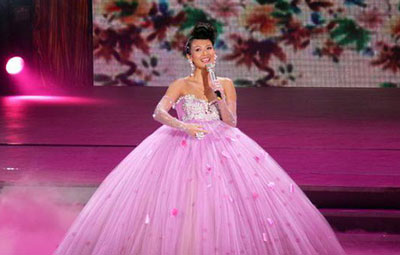Chinese Hollywood actress Zhang Ziyi was accused of lip-synching
during the annual Spring Festival evening gala broadcast live on
Wednesday night on the China Central Television (CCTV), a program
that enjoys top audience ratings worldwide among Chinese.

Zhang, 29, an internationally recognized Chinese actress, lit up
the stage with a pink outfit that drew envious gasps from ordinary
girls.
She sang "Fairy Scattering Flowers," which was specially
composed for her by leading musician Ji Zhongping. Zhang was alone
on stage during the performance.
Comments at Sina.com, a major Chinese news portal, were not too
kind. Posters said that her performance was just ordinary and she
had no real singing skill; it was just her fame that got her
audience attention. The complaints about the program started to
appear almost as soon as the show signed off at about 1:00 a.m.
An article in the Modern Express, a newspaper based in Nanjing,
capital of eastern Jiangsu Province, said that lip-synching was
common during the annual CCTV gala due to "hardware problems".
"Lip-synching at the gala is a tradition," it said, adding Zhang
came in for public criticism because "she was an amateur singer who
was not well-prepared and even forgot words". The article
attributed her poor performance to "a lack of experience".
But Zhang thought she did well. "Fairy Scattering Flowers
symbolizes happiness and auspiciousness. 2008 is especially
important for Beijing and China and each of us. I wish spring would
come earlier so that the snow in disaster areas would melt soon,"
she told reporters.
The gala's general director, Chen Linchun, suggested that
Zhang's performance had actually been live and "was not broadcast
from video".
Zhang made her name with the martial arts blockbuster "Crouching
Tiger, Hidden Dragon" and with "Memoirs of a Geisha", among others.
She was once director Zhang Yimou's favored actress. They
collaborated on "The Road Home", "Hero" and "House of Flying
Daggers".
Every year, CCTV holds a special on Lunar New Year's Eve,
featuring dances, songs and short comedies. This year, the gala had
another theme: unity and the courage of the people to cope with the
snow disaster.
A survey on Sina.com showed that among the performances at this
year's gala, "Blue and White Porcelain" by Taiwan singer Jay Chou
ranked top among the viewers, with the second and third places
taken by girl pop group S.H.E. and Fei Yu-ching, both from
Taiwan.
The annual Spring Festival gala celebration started in the
1980s. Since then, it has been the most popular TV event,
attracting a major portion of China's 1.3 billion population on
Lunar New Year's Eve each year.
Stand-up comedy routines and 'cross-talk' among performers have
been among the most popular parts of the program since 2000.
However, for some years, audiences have been expressing
disappointment at timeworn routines and overly familiar
entertainers.
But this year's audience survey showed that young people were
excited to see such pop stars as Jay Chou.
The Beijing-based Legal Evening News surveyed 800 Chinese, among
whom 153 said they did not watch the gala, as "there are many other
means of entertainment".
More than 80 percent of the respondents watched the show with
their families, eight percentage points more than in last year's
survey by the same newspaper. They believed that "watching the gala
had become a habit" and "the snow disaster thwarted travel plans so
they had nowhere to go".
The survey found that "about 60 percent of the audience are
satisfied with the show" and that "37 percent think it is better
than last year". Respondents said the gala had many new components,
including the snow disaster, the Olympics and the country's first
lunar probe, Chang'e-1.
An epic -- "Warm 2008" -- praising disaster-relief efforts, was
penned by leading poets to boost national morale in the wake of the
snow disaster. It was expressively recited and movingly performed
by famous artists, TV anchors and entertainment stars.
A lady surnamed Zhu from the northern region of Inner Mongolia
said that the poem recital was creative and worth watching a second
time, as she found warmth and inspiration in it.
The state television CCTV was expected to earn a lot from
commercials at the gala. Last year, it earned around 500 million
yuan (68.5 million U.S. dollars) from gala commercials, among which
the auction of midnight ad attracted the highest bid of 10 million
yuan and the bid for the eight-o'clock ad ushering the gala reached
5.75 million yuan.
Local TV stations stage their own celebration parties as well.
Central Hunan's provincial television station and Shanghai's Dragon
TV receive top audience ratings domestically, with a powerful
lineup of popular entertainers. They also avoid the time clash with
CCTV by arranging programs on the day before or after the New
Year's Eve.
(Xinhua News Agency February 8, 2008)